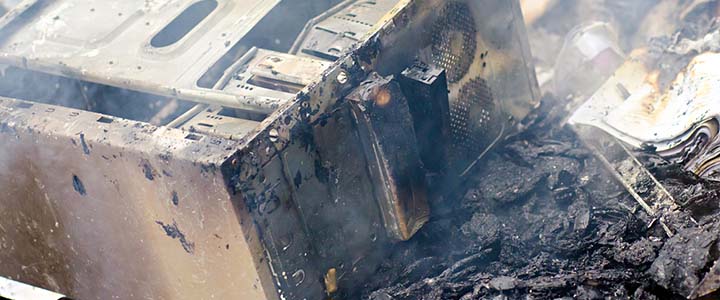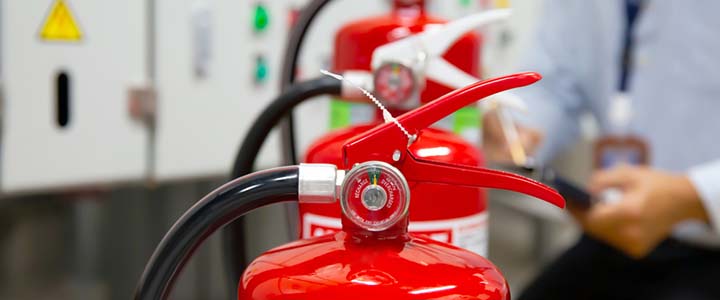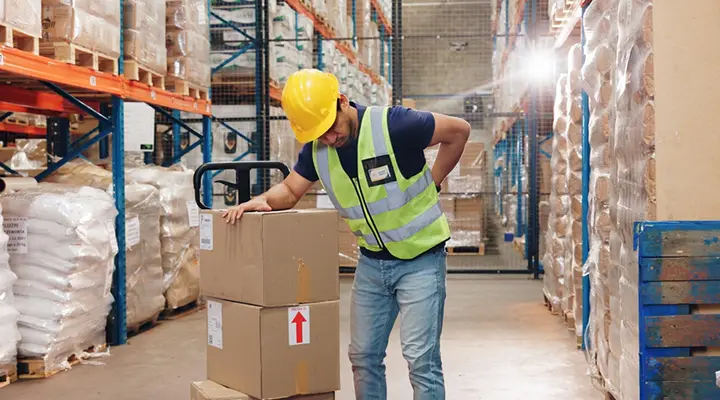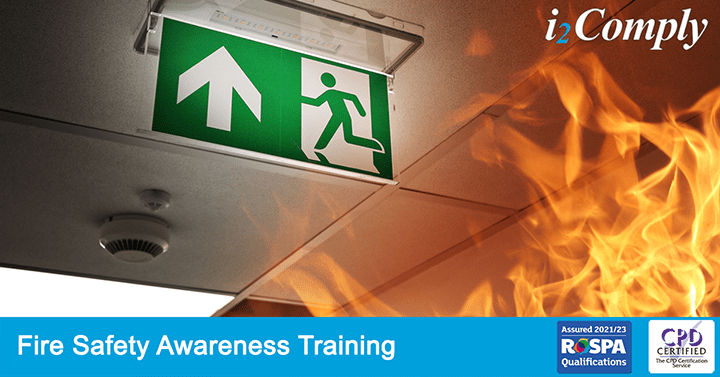Fire safety is a legal requirement. According to the Regulatory Reform (Fire Safety) Order 2005, the Fire Safety (Scotland) Regulations 2006 and the Fire Safety Regulations (Northern Ireland) 2010, the responsible person must carry out regular fire risk assessments to identify, manage and reduce risks of fire. The responsible person is usually an employer, building owner or landlord. They must also ensure that employees receive adequate fire safety training to follow the correct procedures in the event of a fire. If a business fails to comply with the legislation, it can incur large fines and people will be at risk.
Fires can start in any type of premises. For example, in 2023/24, 25,591 fires occurred in dwellings and 13,295 in non-residential buildings in the UK (Fire and rescue incident statistics). Good fire safety practices help to prevent these fire breakouts and protect people and property when a fire does break out.
Our Fire Safety Awareness Course explains the conditions which promote fire, how to prevent fires from starting and what to do should a fire break out. The training course also ensures learners are compliant with the Regulatory Reform (Fire Safety) Order 2005, the Fire Safety (Scotland) Regulations 2006 and the Fire Safety Regulations (Northern Ireland) 2010.
The course is suitable for any type of business, including office environments, schools, nurseries, GP practices and dental surgeries.
Take a look at all of our online Fire Safety courses.
What is fire prevention?
Fire prevention is essential for minimising fire hazards and preventing fire from occurring. This involves regular inspection, maintenance and testing to identify and remove fire hazards. Fire prevention also involves educating people about potential fire hazards and appropriate measures to prevent fire outbreaks.
What is fire protection?
Fire protection measures are crucial to save people and property. Measures include fire evacuation plans, fire detecting systems, fire alarms, fire exit signs, emergency lighting, fire extinguishers and sprinklers. These alert people to the fire and help people to escape safely. They can also enable people to extinguish a fire before it spreads.
Fire emergency evacuation plans determine the actions people should take in a fire emergency. This means that duty holders can be confident about their responsibilities during an evacuation.
Why fire safety is important?
Fires can have devastating effects. During a fire, flames and smoke can spread quickly and cause severe damage to people and property.
Effective fire safety measures and procedures can reduce the risk of injury and save lives. You can reduce fire risks in several ways. For example, you can conduct regular fire risk assessments, maintain fire safety equipment, implement fire prevention measures and educate people about fire safety. Everyone should be aware of possible fire hazards, and they should know how to prevent fire from starting.
How a fire can affect your business
Fires are extremely dangerous – people can lose their life or be seriously injured. In addition, businesses face severe consequences as damage to property and stock can stop their operations.
Businesses lose approximately £657,000 per fire incident. Fires damage buildings, stock, equipment, data and documents. This can all severely affect business operations, or destroy the business altogether.
After a fire, staff may not be able to return to work due to damage to premises. They may need to take sick leave because of the distress they have experienced. Both of these issues can decrease productivity, spoil business relationships and reduce income.
There are many factors that can cause a fire in the workplace and put people in danger. Therefore, it is essential to take fire safety seriously and put proper fire safety measures in place.
Most common causes of fires in the workplace

- Faulty electrical appliances and leads are the most common cause of workplace fires, causing 1,716 fires in 2023/24. Faulty appliances, overloaded sockets, damaged plugs or frayed wiring can be extremely dangerous. This is because they can overheat, cause sparks and start fire.
- Faulty fuel supplies were the cause of 1,443 workplace fires in 2023/24. This includes gas leaks, fuel leaks or defective electrical supplies. So it is essential to ensure regular servicing and repair work by qualified engineers and electricians. Faulty fuel supplies and leaks can be especially dangerous if hot work is carried out in a workplace.
- Placing items too close to a heat source caused 901 workplace fires in 2023/24. Any kind of combustible material, such as paper, wood, plastic, oil, gas and liquids can ignite if they are too close to a heat source. It is especially dangerous if levels of combustibles build up.
- Misuse of equipment or appliances caused 1,057 fires in UK workplaces in 2023/24. For example, spills on electrical equipment, portable heaters left on, greasy appliances and dusty equipment are common causes of fire.
- Arson also accounts for a substantial number of workplace fires. In 2023/24, 4,104 fires in non-residential premises were started deliberately. Inefficient security systems and uncontrolled access to premises can make it easy for people to commit arson.
How to ensure fire safety in the workplace

Everyone in a workplace is responsible for fire safety and has a duty to familiarise themselves with fire safety measures. Employers have a legal duty to ensure that the workplace is safe for both employees and visitors.
The responsible person is obliged by law to assess fire risks, take reasonable measures to reduce the risk of fire and ensure that people can escape safely in the event of a fire.
Review Fire Risk Assessments regularly
Section 156 of the Building Safety Act 2022 makes it a legal requirement for all premises that come under the Fire Safety Order 2005 to record fire risk assessments in full, regardless of the size of the organisation or type of building.
The person carrying out the fire risk assessment must be identified in the risk assessment.
The fire risk assessment must identify fire hazards and people that may be at risk. An employer must then develop measures to remove or reduce these risks. Going forward, it is essential to review the fire risk assessment regular to ensure long-term fire safety in the workplace.
Maintain electrical equipment
Faulty, overloaded, electrical wiring or appliances cause fires. To prevent these electrical fires, an organisation must repair or remove all faulty electricals, and prevent overloaded sockets. In addition, a competent person must regularly inspect any electrical equipment.
Ensure good housekeeping
Workplaces must be kept clean and tidy. Any waste should be removed. Clutter, grease or dust pose a fire hazard. Greasy or dusty equipment can overheat and flammable materials (cardboard, wood, plastics, fabrics) can fuel a fire. Therefore an organisation must store and control waste materials properly so that they do not pose a fire hazard.
Maintain fire safety equipment
Fire safety equipment can detect fire, alert employees and visitors about the fire in the premises, help them escape safely and potentially extinguish a fire before it spreads. Examples include fire detectors, fire alarms, exit signs, emergency lighting, fire extinguishers and sprinklers.
Assign Fire Marshals
Fire Marshals or Fire Wardens assist the responsible person in fire prevention and emergency procedure planning. Fire Marshals are also in charge of helping people evacuate safely in an emergency. All employees should know who their Fire Wardens are. If your business does not have one, we offer comprehensive and convenient Online Fire Marshal Training. Our course has been taken by all sectors, including Hospitality, Education and Legal & Accounting.
Ensure that employees receive fire safety training
All employees must receive fire safety training and understand fire safety measures in the workplace. Employees must be well informed on how to recognise fire hazards and how to act in an emergency. This includes how to raise a fire alarm, where the fire exits are, and how to evacuate the building safely.
How often do staff require fire training?
All employees should receive fire safety training when they are first employed. The training should ensure they are familiar with fire safety arrangements and emergency procedures in the workplace. In addition, they should regularly receive refresher training.
An organisation should provide training whenever staff are exposed to new or increased fire risks. If anything relevant changes in the workplace, staff should receive additional training. For example, a new layout in the workplace may alter escape routes.
Organisations will need to carry out Fire Safety training more frequently in some businesses. This can be necessary where a business has a high staff turnover, higher risk of fire, or particular responsibility to protect people. People who need to be protected include hotel guests, vulnerable residents and patients.
Well-trained employees understand the importance of fire safety measures and they are less likely to panic in an emergency. They know how to act if a fire does break out in the workplace, and they can safely and quickly evacuate the premises.
Need Fire Safety training?
We offer the following online Fire Safety training courses:
1 – Online Fire Safety Awareness Training
2 – Online Fire Marshal / Warden Training
3 – Online Fire Extinguisher Awareness Training




